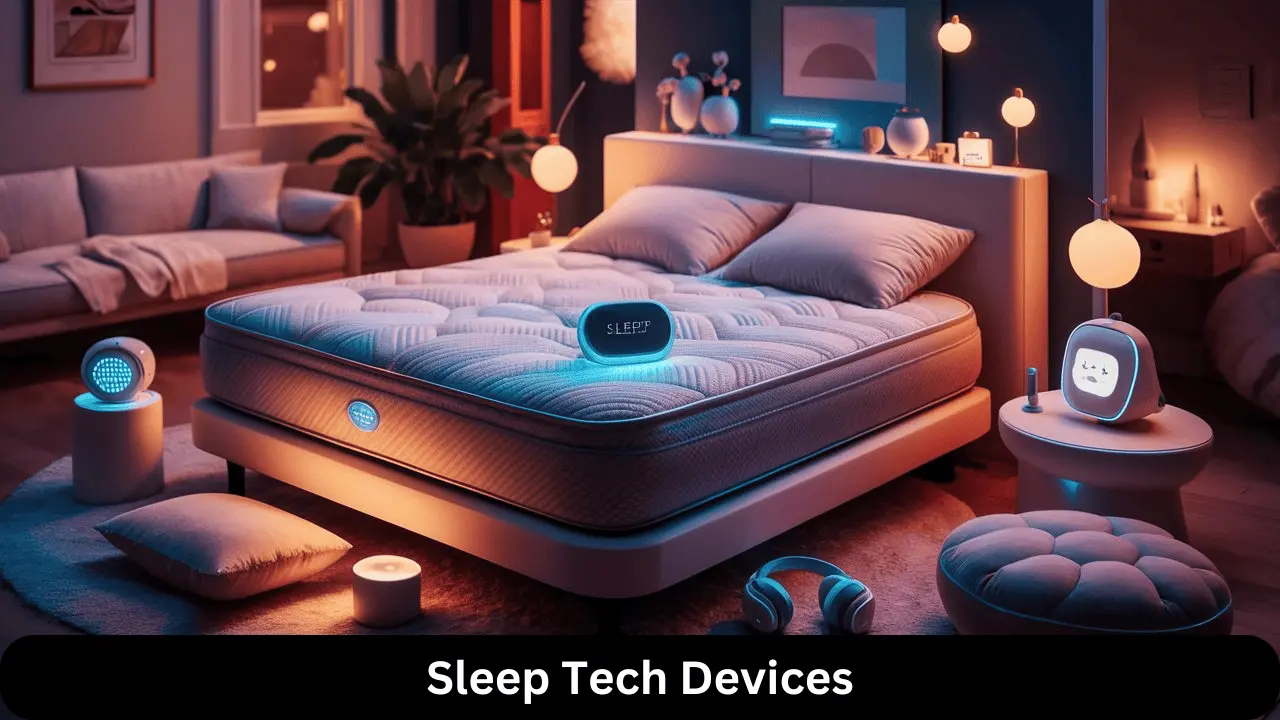Alright, let’s dive into the world of sleep tech devices! Ever found yourself tossing and turning at night, wondering if there’s a gadget out there that could magically transport you to dreamland? Well, you’re in luck, because the sleep tech industry is booming faster than you can say “counting sheep.”
Sleep: We all need it, most of us love it, and yet somehow, it often eludes us like that one sock that mysteriously disappears in the laundry. But fear not, fellow sleep enthusiasts! The tech world has heard our collective yawns and responded with a dazzling array of sleep tech devices designed to help us catch those elusive Z’s.
From smart mattresses that adjust to your every move to headbands that claim to lull you into slumber with soothing sounds, we’re living in a golden age of sleep technology. But with so many sleep tech devices options out there, how do you separate the dream devices from the nightmare gadgets? Buckle up, buttercup – we’re about to take a deep dive into the world of sleep tech devices.
The Rise of Sleep Tech Devices: More Than Just Counting Sheep
Remember when the height of sleep technology was a white noise machine that sounded like a broken radio? Those days are long gone, my friends. The sleep tech industry has exploded in recent years, with global sales expected to reach astronomical figures that would make even everyone’s eyes pop.
But why the sudden interest in our nocturnal habits? Well, for starters, we’ve finally woken up (pun intended) to the importance of good sleep. It turns out that catching quality Z’s is linked to everything from better mental health to improved productivity. And let’s face it – in a world where we’re expected to be “always on,” the ability to switch off has become a coveted superpower.
Enter sleep tech devices: the cape-wearing heroes of the bedroom, promising to rescue us from the villainous clutches of insomnia and poor sleep quality. But before we start throwing our money at every gadget that promises eight hours of blissful slumber, let’s break down the main categories of sleep tech devices.
Smart Mattresses: The Foundation of Good Sleep
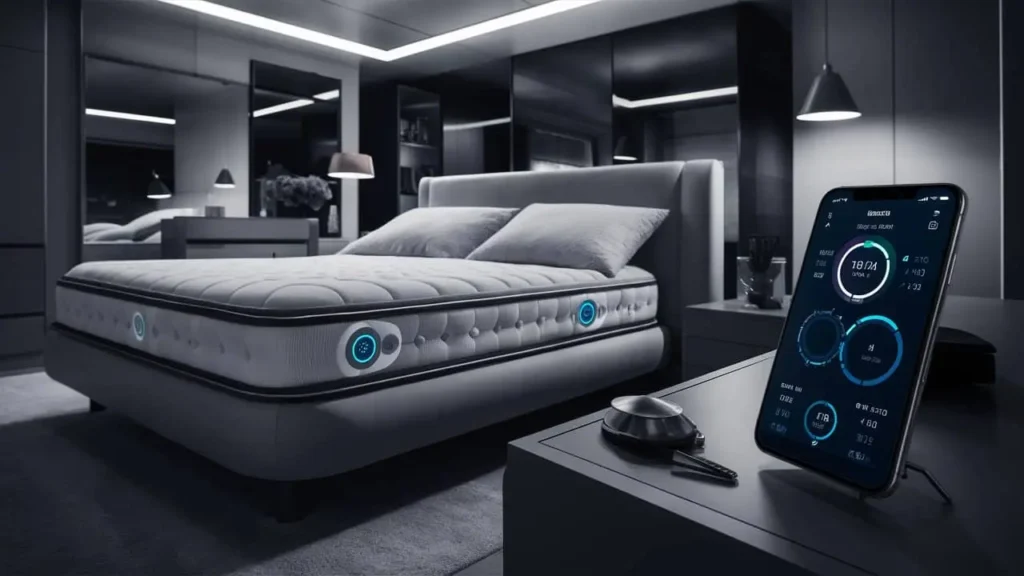
Imagine a mattress that knows you better than your significant other. Creepy? Maybe a little. Awesome? Absolutely. Smart mattresses are leading the charge in sleep tech devices, packed with more technology than your average smartphone.
These high-tech sleeping surfaces use sensors to track your movement, breathing rate, and even your heart rate throughout the night. Some models can adjust their firmness on the fly, ensuring you’re always sleeping on your perfect bed, whether you’re on your back, side, or doing that weird starfish thing.
But the real magic happens when these mattresses sync with your smartphone. They’ll give you a detailed report of your sleep quality, complete with graphs that’ll make you feel like a sleep scientist. Did you know you toss and turn exactly 27 times between 2 and 3 AM? Well, now you do!
Some smart mattresses even come with built-in heating and cooling systems. So whether you’re a “burrito wrapped in blankets” sleeper or more of a “one leg out” kind of person, these beds have got you covered (or not, depending on your preference).
Sleep Trackers: Knowledge is Power (and Good Sleep)
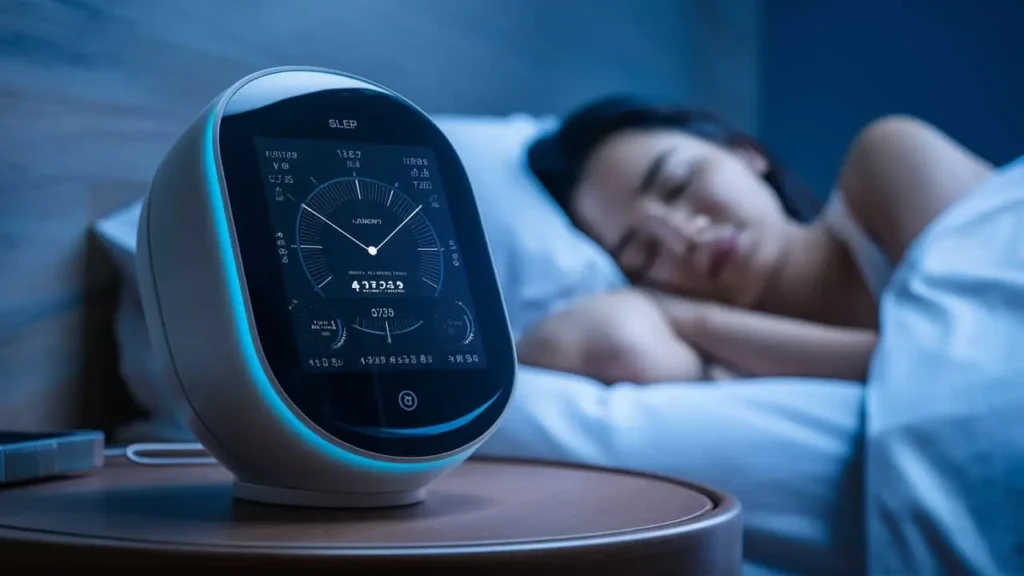
If you’re not ready to drop a small fortune on a smart mattress, sleep trackers offer a more affordable entry point into the world of sleep tech devices. These devices come in various forms – wristbands, rings, or even thin strips that slide under your mattress.
Like their mattress cousins, sleep trackers monitor your movements and vital signs throughout the night. But they go a step further by analyzing your sleep cycles. Ever wondered why you sometimes wake up feeling refreshed after six hours of sleep, while other times you feel like a zombie after eight? Sleep cycles, my friend.
These nifty gadgets will tell you exactly when you’re in light sleep, deep sleep, or REM sleep. They’ll even wake you up at the optimal point in your sleep cycle, so you don’t feel like you’ve been hit by a truck when your alarm goes off.
But here’s where it gets really interesting: many sleep trackers don’t just track your sleep. They also monitor your daytime activities, like exercise and stress levels, to help you understand how your habits affect your sleep. Spent the afternoon mainlining espressos and wonder why you can’t sleep? Your tracker will connect those caffeinated dots for you.
Smart Alarm Clocks: Wake Up on the Right Side of the Bed
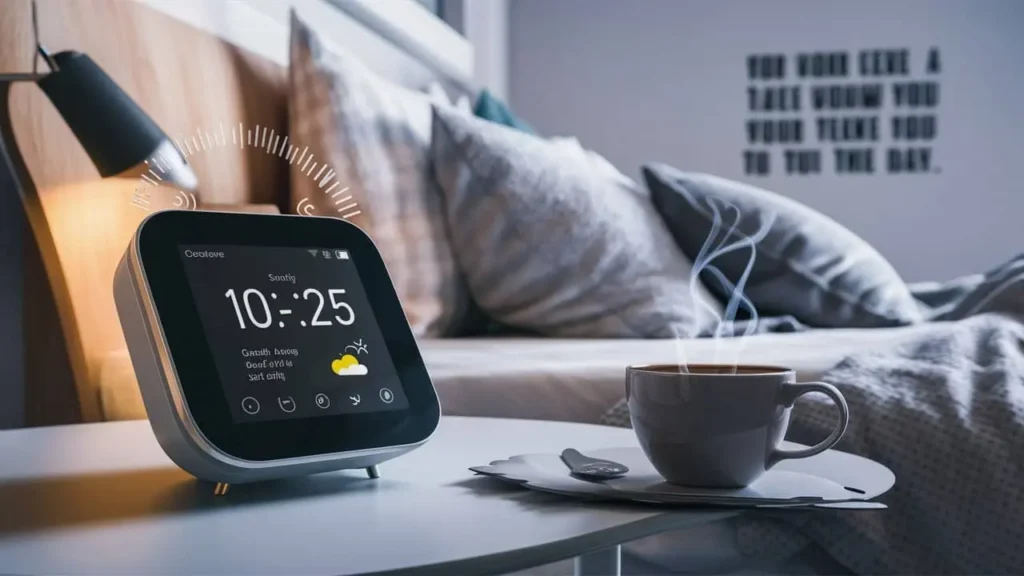
Gone are the days when alarm clocks were just screaming boxes of misery. Today’s smart alarm clocks are more like personal sleep assistants, determined to make your mornings as pleasant as possible (or at least, less terrible).
Many of these devices use light therapy to wake you up gradually, mimicking the natural sunrise. Imagine waking up to a soft, warm glow instead of the jarring “BEEP BEEP BEEP” of traditional alarms. It’s like being gently roused by a Disney princess instead of having a bucket of ice water dumped on your head.
But wait, there’s more! Some smart alarm clocks can sync with your sleep tracker to wake you up during your lightest sleep phase. They can also connect to your smart home devices, so you can wake up to your favorite playlist, the smell of freshly brewed coffee, or even the sweet sound of your robotic vacuum starting its morning routine (because nothing says “good morning” like a clean floor, right?).
White Noise Machines and Sleep Sound Apps: The Lullaby of the 21st Century
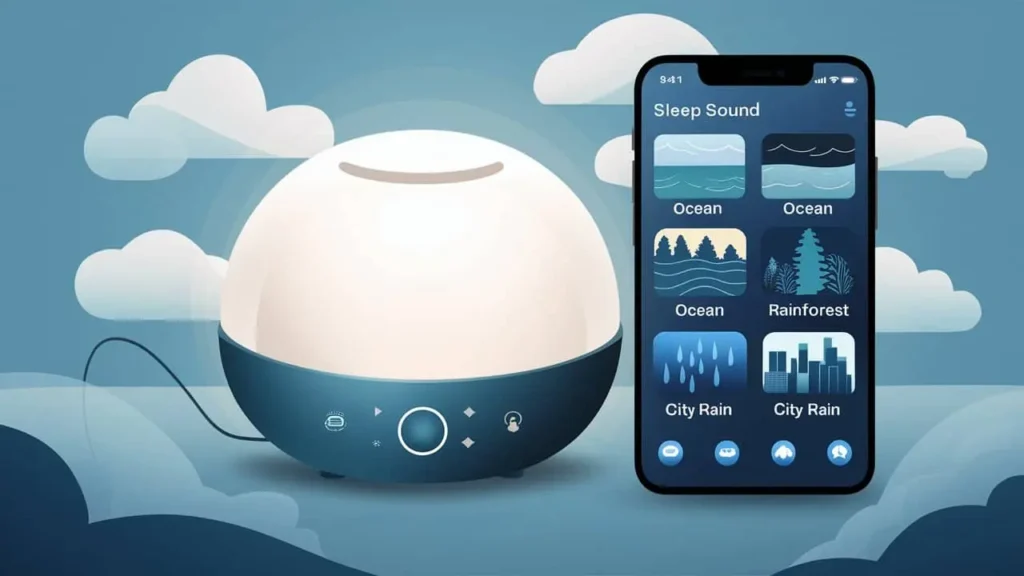
For some of us, silence isn’t golden – it’s deafening. That’s where white noise machines and sleep sound apps come in. These devices have come a long way from the static-y rainforest sounds of yore.
Modern white noise machines offer a smorgasbord of soothing sounds, from ocean waves to city rain, from purring cats to… the inside of a womb? (Yes, that’s a real option, and no, we don’t want to know how they recorded it.)
But the real game-changers are the AI-powered sound apps. These clever programs don’t just play pre-recorded loops – they generate unique soundscapes that evolve throughout the night, reducing the chance that you’ll become desensitized to the noise.
Some apps even adapt to your environment, using your phone’s microphone to detect and mask sudden noises that might disturb your sleep. Dog barking outside? No problem – your app will seamlessly increase the volume of those soothing ocean waves to drown it out.
Sleep Headphones and Earbuds: Lullabies for the 21st Century
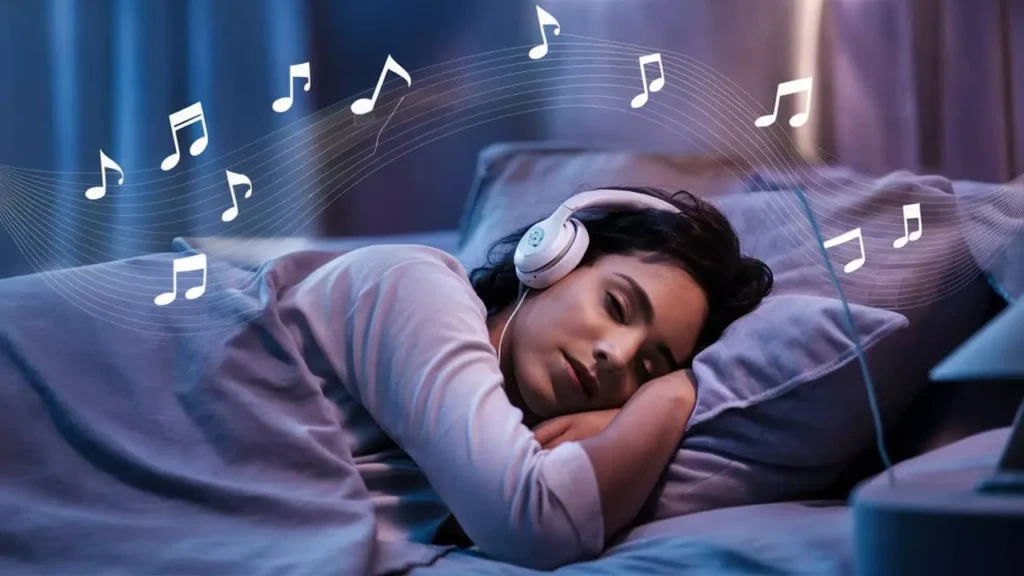
For those who share a bed with a snoring partner or live in noisy environments, sleep headphones and earbuds can be a game-changer. These aren’t your standard earbuds, mind you – they’re designed to be comfortable even when you’re lying on your side, which is a feat of engineering if you ask me.
Some models go beyond just playing audio. They use bone conduction technology to transmit sound through your skull, leaving your ear canals free. It’s like having a tiny DJ inside your head, but way less creepy and way more sleep-inducing.
The most advanced sleep earbuds even come with active noise cancellation, creating a cocoon of silence around you. Snoring partner? What snoring partner? All you hear is the gentle sound of waves lapping at a distant shore (or whatever your sleep sound of choice happens to be).
Smart Lighting: Setting the Mood for Sleep
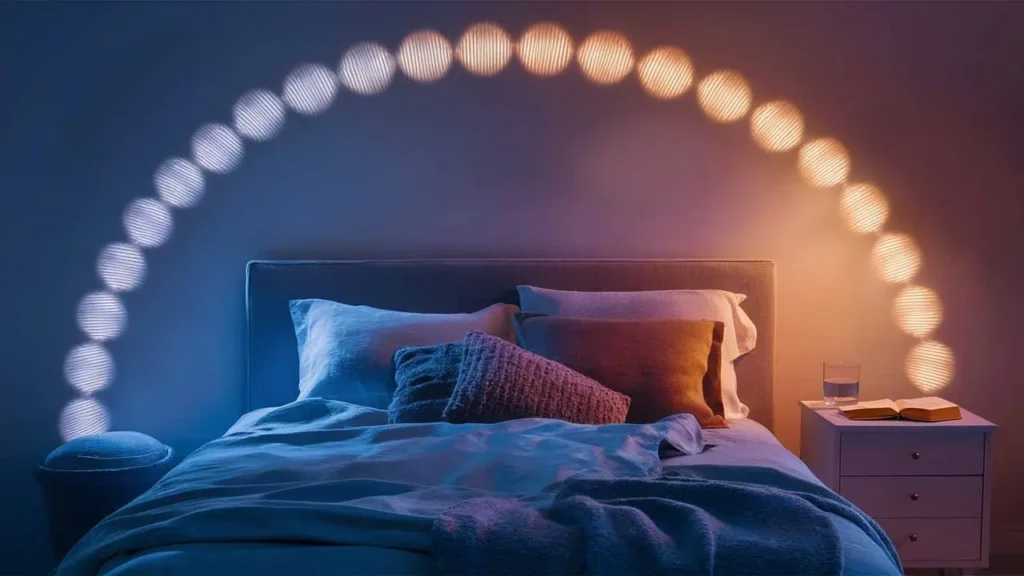
We’ve known for a while that light plays a crucial role in our sleep-wake cycle. But it’s only recently that we’ve been able to harness this knowledge with smart lighting systems designed to promote better sleep.
These systems go beyond just dimming the lights at bedtime. They can adjust the color temperature of your lights throughout the day, mimicking natural light patterns. As evening approaches, they’ll gradually shift to warmer, redder tones that signal to your body that it’s time to start producing melatonin, the sleep hormone.
Some smart bulbs can even be programmed to simulate a sunset, gradually dimming over the course of an hour to ease you into sleep mode. And in the morning, they’ll do the reverse, gently brightening to help you wake up naturally. It’s like having your own personal sun, minus the skin cancer risk.
Sleep-Enhancing Wearables: From Headbands to Cooling Caps
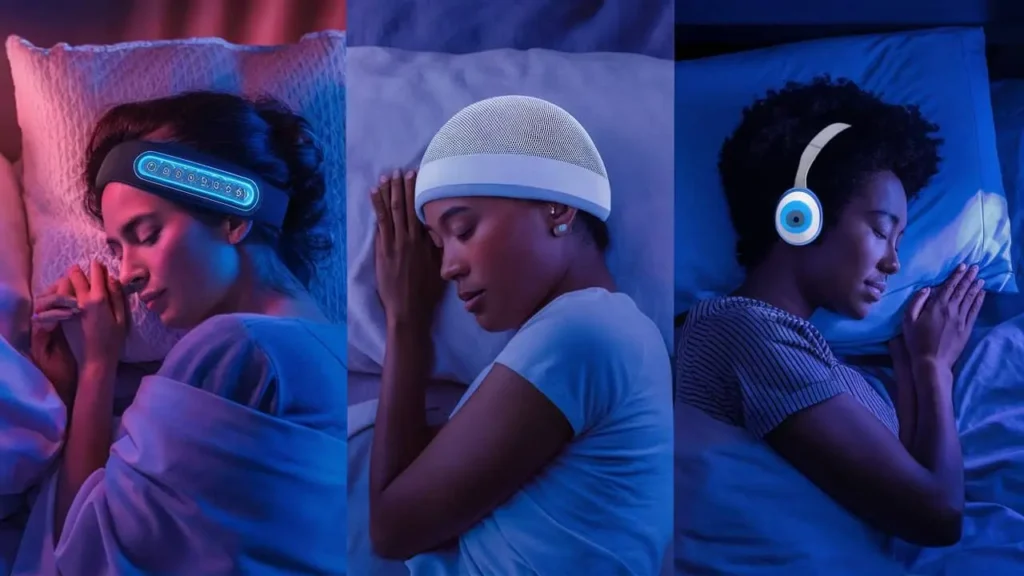
If you thought sleep tech stopped at your mattress or nightstand, think again. There’s a whole world of wearable devices designed to enhance your sleep, and some of them look like they’ve come straight out of a sci-fi movie.
Take sleep headbands, for instance. These futuristic-looking devices claim to improve your sleep by playing “pink noise” – a type of noise that’s been shown to enhance deep sleep. Some even use EEG sensors to track your brain waves and adjust the audio in real-time. It’s like a lullaby tailored specifically to your brain.
Then there are cooling caps and pillows designed to lower the temperature of your head and neck. Why? Because a slight drop in core body temperature is associated with the onset of sleep. These devices basically trick your body into thinking it’s bedtime. Sneaky? Yes. Effective? Many users swear by them.
The Future of Sleep Tech Devices: What’s Next?
As impressive as current sleep tech devices are, the future of sleep tech devices promises even more mind-blowing innovations. We’re talking about AI-powered sleep coaches that can predict when you’re likely to have a bad night’s sleep and intervene before it happens.
Imagine a smart home system that doesn’t just track your sleep, but actively works to improve it. Your lights, thermostat, white noise machine, and even your smart curtains could all work in harmony to create the perfect sleep environment based on your personal data.
There’s even talk of devices that can influence your dreams. While the ethics of dream manipulation are still up for debate, the possibility of programming your own dreams is tantalizing. Nightmare sufferers, rejoice – your days (or nights) of terror may be numbered!
The Bottom Line: To Sleep Tech or Not to Sleep Tech?
With all these amazing devices at our fingertips, you might be wondering if you need to mortgage your house to buy every sleep gadget on the market. The answer, of course, is no. While sleep tech devices can be incredibly helpful, it’s not a magic bullet.
The best sleep tech devices in the world can’t compensate for poor sleep hygiene. No smart mattress can overcome the effects of that triple espresso you had at 9 PM, and no sleep tracker can force you to stick to a consistent sleep schedule.
That said, if you’re struggling with sleep issues, the right sleep tech devices could be a game-changer. Maybe a white noise machine is all you need to drown out your noisy neighbors, or perhaps a sleep tracker will help you identify patterns you never noticed before.
The key is to start small when exploring sleep tech devices. Try a sleep tracking app on your smartphone before investing in a dedicated device. Experiment with a sleep sounds app before splurging on a high-end white noise machine. And always, always prioritize the basics: a dark, quiet, cool bedroom, and a consistent sleep schedule.
Remember, at the end of the day (or night), the goal of sleep tech devices is to help you sleep better, not to complicate your life or empty your wallet. So choose wisely, sleep deeply, and may all your dreams be sweet – with or without the help of a dream-manipulating headband.
Sweet dreams, tech lovers!
Now, I’d love to hear from you! Have you tried any sleep tech devices? What was your experience? Or maybe you have a tried-and-true, tech-free sleep hack? Share your thoughts in the comments below. Let’s start a conversation about catching those elusive Z’s in the digital age!

